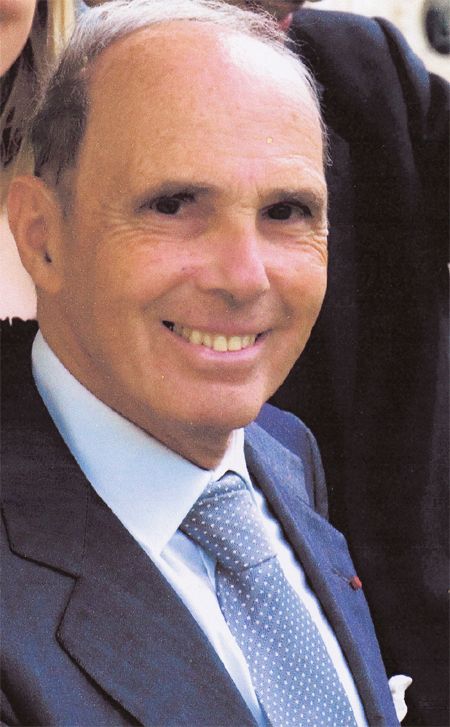The life of Bruno Lussato - The early years - 1950's
by Kevin Bronstein

It is with a certain emotion that I write my first Blog in honour of our friend and mentor Professor Bruno Lussato. Whereas it is my firm intention to contribute to this blog in a manner similar to the spirit of the Professor I believed it appropriate to start my series of blogs with posts about him. Specifically I shall aim to retrace his voyage through life that brought him to the broad array of themes and emotions presented in this blog. I will gradually describe my relationship with him but also involve the people who knew him best to add yet another layer of understanding to this extraordinary character. All this of course will solely be in an effort to continue along the path of learning he has traced for us all and I wholeheartedly encourage you to share with us your comments or anecdotes as you see fit.
I met the Professor in 1955 in Paris, I was 23. He was at the time following the classes of the famous Raymond Boisde at the CNAM where he would later teach for almost 50 years. I had travelled to France intrigued to see how systems theory would be applied in a country in the process of rebuilding. It was the defining “trente glorieuses” the thirty grand years where a battered Europe managed to rebuild itself out of its ruins with undeniable help of American market theory. For that reason, and at that time only, theory and systems meant more than a mere academic exercise but truly represented the way forward - in an applied fashion. Knowing theory, embracing it meant seeing the future and helping to define it. Soon enough Bruno and I connected around the topic of centralized vs. decentralized organisations and systems. His fiery personality and stern determination already let his extraordinary ability to convince and organise transpire. From the start he was anchored in the camp of decentralization and believed in the human being. At that time this view was starkly opposed to the predominance of the mainstream desire to centralise and computerise the planet. We were all so mesmerized by the beauty of these 300ton machines, these super computers that had the groundbreaking processing ability of up to 256kb, that the Professor’s early message of human first, machines second was about as welcome as a parent at a teenager road trip.
I returned to Canada and did not see the Professor until the fall of 1960, by complete coincidence at a conference in Dayton, Ohio. He had joined the BHV (a curiously French hybrid of a department and a hardware store) as an organisational engineer and had managed to secure himself a teaching position at the CNAM and HEC, the famous business school. We attended Trujillo’s brilliant Modern Merchandising Methods (MMM) seminar coaching modern retailers across the world through his International Seminars at the NCR headquarters. Together we met Gerard Mulliez (his future client) and
Pierre Fournier (of Carrefour) as only representatives of French retailing. Galeries Lafayette, Printemps etc.. (Macy’s like stores) all ignored these seminars to their loss time would show. One of my most vivid memories was Trujillo’s expression destined to retail owners to create islands of losses (sensational deeply discounted products destined to lure helpless and greedy consumers) in oceans of profits (all other products ranging from toilet paper to fruits and vegetables carrying higher margins). The path was clear, expand as fast as possible, as aggressively as possible even if this presented a certain risk at a time were the high street still was your predominant mean of distribution. The professor returned to France with this new gospel and I went back to advise the Canadian Grocery Cooperative with the same message. We share other convictions as we both were adamant followers of the Seattle School, Stafford Beer, Churchman and Herbert Simon. Bruno was so passionate about their teachings that I know he later imported their methods under the banner of Large Scale Integrated Information System.
Next blog I shall talk about my encounters with the professor in the 60’s and 70’s, period where he started fraying his own theory of information and systems but also his forays into micro computing and high level consulting assignments.
Very truly Yours,
Kevin Bronstein
Kevin Bronstein was born in 1932 in the city of London, Ontario. He started his early career at the The Ontario Ministry of Economic Development and Trade. He then joined the Economic Development Corporation where he also visited as a Professor at the Wharton School in Philadelphia, PA. He holds a doctorate in Idiosyncracy and has published widely on the topic. His analysis of systemic risk has been referred to by many as a “cornerstone of modern financial theory” and a “keystone to portfolio theory”. Dr. Bronstein has held several senior board positions at CPC (Canadian Paper Company) sits on the Investment committee of Mapletree Investments and founded the ICART (International committee for the advancement of reversionary theory) which has since 1997 merged with the WEF (World Economic Forum). In addition to his business and academic achievements, Kevin Bronstein founded the Fanshawe Lake Cultural Centre where dignitaries, artists and businessmen from the entire planet gather around cultural events 12 times a year.